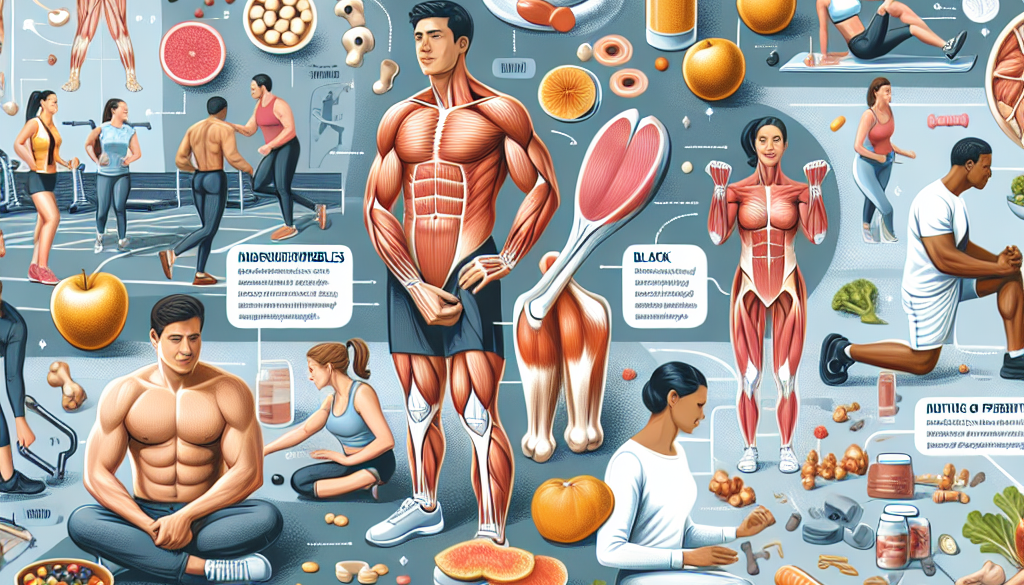Nutritional Strategies to Promote Muscle and Joint Health
-
Table of Contents
- Nutritional Strategies to Enhance Muscle and Joint Health
- Understanding Muscle and Joint Health
- Protein: The Building Block of Muscles
- Omega-3 Fatty Acids: Anti-Inflammatory Powerhouses
- Antioxidants: Combatting Oxidative Stress
- Calcium and Vitamin D: A Synergistic Duo for Bone Health
- Collagen and Gelatin: Supporting Joint Health
- Hydration: Essential for Muscle Function
- Case Studies and Statistics
- Conclusion: Key Takeaways for Optimal Muscle and Joint Health
- ETprotein: Your Partner in Muscle and Joint Health
Nutritional Strategies to Enhance Muscle and Joint Health

Maintaining muscle and joint health is crucial for a vibrant and active lifestyle. As we age, our muscles and joints can deteriorate, leading to discomfort and reduced mobility. However, with the right nutritional strategies, it’s possible to support and even improve the health of these vital body parts. This article will delve into the various dietary approaches and specific nutrients that can promote muscle and joint health.
Understanding Muscle and Joint Health
Before diving into nutritional strategies, it’s essential to understand the basics of muscle and joint health. Muscles require protein, energy, and various nutrients to function optimally, while joints depend on a healthy cartilage and adequate lubrication to move smoothly. Inflammation and oxidative stress can damage both muscles and joints, so managing these factors is key to maintaining health.
Protein: The Building Block of Muscles
Protein is fundamental for muscle repair and growth. Consuming adequate amounts of high-quality protein is essential, especially after exercise. Here are some protein-rich foods to include in your diet:
- Lean meats such as chicken, turkey, and lean cuts of beef
- Fish, particularly fatty fish like salmon, which also provide omega-3 fatty acids
- Dairy products like milk, yogurt, and cheese
- Plant-based proteins such as beans, lentils, tofu, and tempeh
It’s important to distribute protein intake throughout the day to maximize muscle protein synthesis. Aim for at least 20-30 grams of protein per meal.
Omega-3 Fatty Acids: Anti-Inflammatory Powerhouses
Omega-3 fatty acids are well-known for their anti-inflammatory properties, which can benefit joint health. They can help reduce the inflammation associated with arthritis and other joint conditions. Sources of omega-3s include:
- Fatty fish like salmon, mackerel, and sardines
- Flaxseeds, chia seeds, and walnuts
- Fortified foods and supplements
Incorporating these foods into your diet or taking a high-quality omega-3 supplement can help manage joint inflammation.
Antioxidants: Combatting Oxidative Stress
Oxidative stress can damage muscle tissue and joint structures. Antioxidants neutralize free radicals, protecting the body from this damage. Include a variety of antioxidant-rich foods in your diet, such as:
- Berries, such as blueberries, strawberries, and raspberries
- Dark leafy greens like spinach and kale
- Nuts and seeds
- Whole grains
- Green tea
These foods not only provide antioxidants but also a range of other beneficial nutrients.
Calcium and Vitamin D: A Synergistic Duo for Bone Health
Calcium is essential for bone health, and vitamin D helps the body absorb calcium. Together, they play a critical role in maintaining strong bones, which support muscles and joints. Good sources of calcium and vitamin D include:
- Dairy products like milk, cheese, and yogurt
- Fortified plant-based milks and juices
- Fatty fish for vitamin D
- Egg yolks
Spending time in the sun can also help your body produce vitamin D, but be mindful of skin protection and exposure limits.
Collagen and Gelatin: Supporting Joint Health
Collagen and gelatin are proteins that can support joint health by providing the building blocks for cartilage. Bone broth is a natural source of gelatin, and collagen supplements are also available. Some studies suggest that collagen supplements can improve joint pain and function.
Hydration: Essential for Muscle Function
Proper hydration is crucial for muscle function. Water helps transport nutrients to the muscles, maintains the balance of electrolytes, and prevents muscle cramps. Aim to drink at least 8 cups of water per day, or more if you’re active or live in a hot climate.
Case Studies and Statistics
Research has consistently shown the benefits of these nutritional strategies for muscle and joint health. For example, a study published in the “Journal of the International Society of Sports Nutrition” found that omega-3 supplementation significantly reduced joint pain in athletes. Another study in “Osteoarthritis and Cartilage” reported that collagen supplementation improved joint pain in individuals with osteoarthritis.
Conclusion: Key Takeaways for Optimal Muscle and Joint Health
To promote muscle and joint health, focus on a balanced diet rich in protein, omega-3 fatty acids, antioxidants, calcium, and vitamin D. Stay hydrated and consider supplements like collagen if needed. By incorporating these nutritional strategies, you can support the health and function of your muscles and joints, leading to a more active and comfortable life.
ETprotein: Your Partner in Muscle and Joint Health
If you’re looking to enhance your muscle and joint health through nutrition, ETprotein’s range of protein products can be an excellent addition to your diet. Their organic bulk vegan proteins, including rice, pea, and various seed proteins, provide high-quality, plant-based options for those seeking to increase their protein intake. Additionally, their L-(+)-Ergothioneine (EGT) products offer antioxidant support that can help protect muscles and joints from oxidative stress.
ETprotein’s commitment to non-GMO, allergen-free products with high purity levels makes them a trusted choice for consumers focused on health and wellness. Whether you’re an athlete, dealing with joint discomfort, or simply aiming to maintain muscle and joint health, ETprotein has a solution to meet your needs.
About ETprotein:
ETprotein, a reputable protein and L-(+)-Ergothioneine (EGT) Chinese factory manufacturer and supplier, is renowned for producing, stocking, exporting, and delivering the highest quality organic bulk vegan proteins and L-(+)-Ergothioneine. They include Organic rice protein, clear rice protein, pea protein, clear pea protein, watermelon seed protein, pumpkin seed protein, sunflower seed protein, mung bean protein, peanut protein, and L-(+)-Ergothioneine EGT Pharmaceutical grade, L-(+)-Ergothioneine EGT food grade, L-(+)-Ergothioneine EGT cosmetic grade, L-(+)-Ergothioneine EGT reference grade and L-(+)-Ergothioneine EGT standard. Their offerings, characterized by a neutral taste, non-GMO, allergen-free attributes, with L-(+)-Ergothioneine purity over 98%, 99%, cater to a diverse range of industries. They serve nutraceutical, pharmaceutical, cosmeceutical, veterinary, as well as food and beverage finished product distributors, traders, and manufacturers across Europe, USA, Canada, Australia, Thailand, Japan, Korea, Brazil, and Chile, among others.
ETprotein specialization includes exporting and delivering tailor-made protein powder and finished nutritional supplements. Their extensive product range covers sectors like Food and Beverage, Sports Nutrition, Weight Management, Dietary Supplements, Health and Wellness Products, and Infant Formula, ensuring comprehensive solutions to meet all your protein needs.
As a trusted company by leading global food and beverage brands and Fortune 500 companies, ETprotein reinforces China’s reputation in the global arena. For more information or to sample their products, please contact them and email sales(at)ETprotein.com today.












